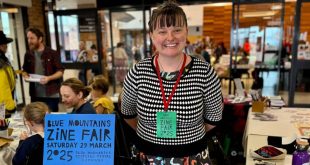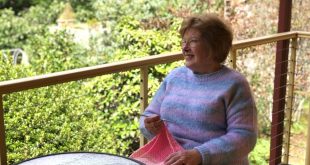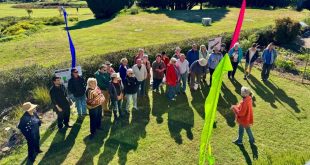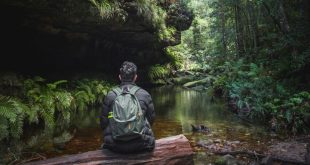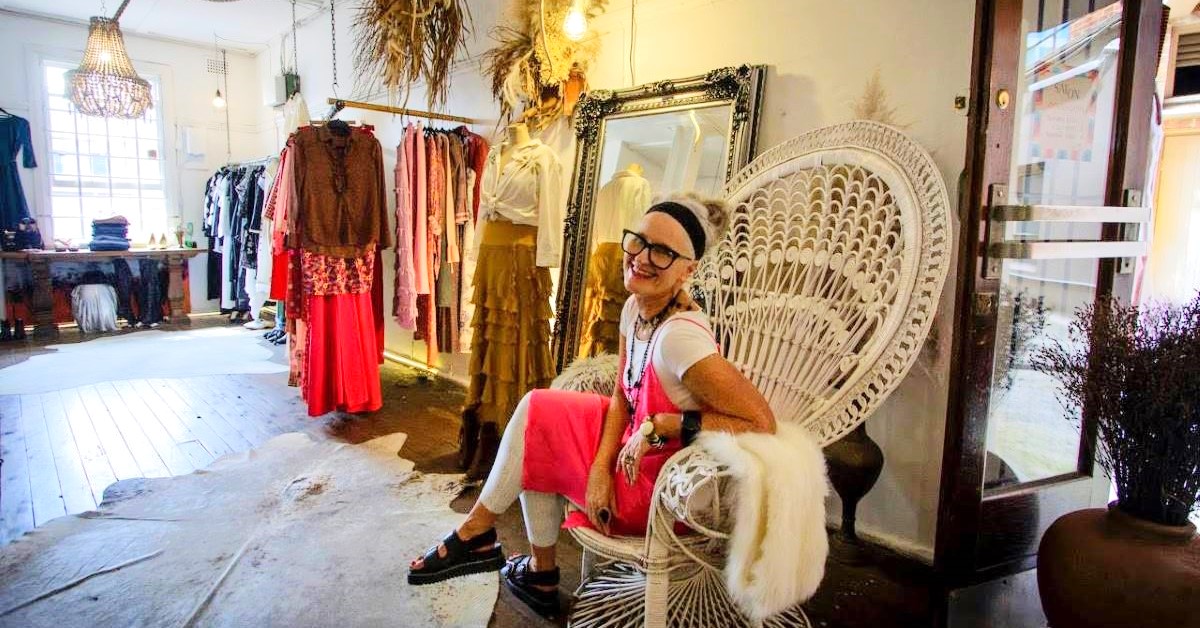
Sal Isaksen at her store SalOn in Katoomba
Story and photos by Camille Walsh
There’s a shop in the Town Centre Arcade in Katoomba called SalOn. It’s a unique space, selling clothes, shoes, scarves, belts, bags and jewellery. Each item is lovingly and intentionally hand-picked but even better than that: it’s all environmentally conscious, sustainable fashion!
Key Points:
- The fashion industry is responsible for 20% of all global waste water, enough to quench the thirst of five million people.
- It is believed to be the second most polluting industry in the world, in second place behind oil, producing more carbon emissions than all international flights and maritime shipping combined
- Buying pre-loved fashion is one of the best ways to reduce your ‘fashion footprint’
When you first step into SalOn it’s somewhat of an assault on the senses – in a good way; a veritable Aladdin’s cave of sequins and silks, faux furs and florals, with every piece whispering stories of their respective, pre-loved lives. For someone like me, who’d describe themselves as ‘not much of a shopper’, all this could seem overwhelming at first, however, standing steady in the midst of it all with a welcoming smile, is business owner, Sal Isaksen.
With over 25 years’ experience in women’s fashion, Sal knows her stuff. At the risk of coining an oft used retail cliché, treating yourself to something from Sal-on is so much more than simply picking up a few new pieces for your wardrobe. It’s an entire shopping experience!
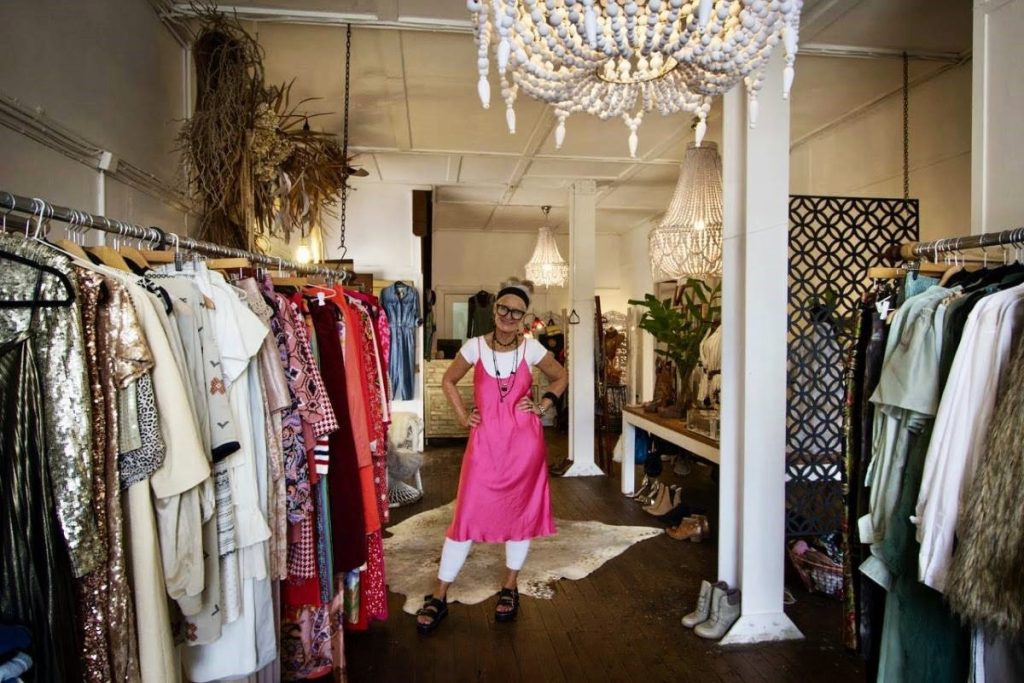
Sal walks the sustainable fashion walk
Sal’s love affair with fashion began at a very early age. Growing up in Cowra in the Central West of NSW, she fondly and vividly recalls the joy she felt ‘playing shop’ with her siblings. At the tender age of 4 she was already hooked, knowing, albeit perhaps not consciously at the time, that to her, the retail fashion environment felt like home.
Fast forward to her early adult years and Sal was committed to honing her craft, studying at a fashion college in Glebe and selling her own pre-loved clothing at markets throughout Sydney. Her connection to the market scene continues to this day and although she has switched from seller to buyer, Sal still gets the same buzz from wandering around markets: soaking up the community feel, the rummaging, the bargaining – all of which is channelled into the pieces she buys to sell in her own boutique.
Sal’s definition of sustainable fashion is ‘something that has a long life, is re-used and worn again and again.’ Whilst as a child she admits to having felt shame that she and her siblings often wore second hand clothing from charity stores, an awakening followed as an adult: to shop in this way was not only economical, but environmentally responsible – and this was long before ‘sustainable fashion’ was even a thing.
In previous business ventures, Sal has stocked new clothing off the factory shelves but she is adamant that the feeling she gets from selling pre-loved items far surpasses that of retailing something made on a production line.
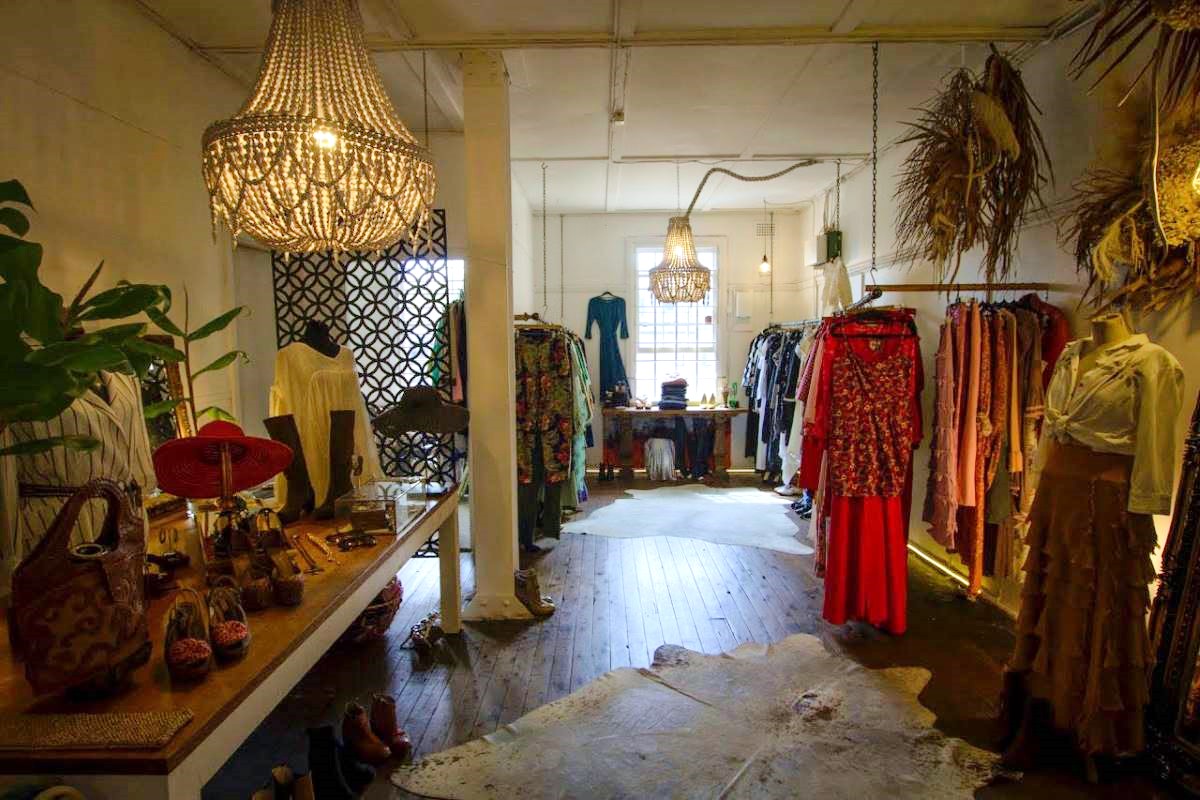
SalOn Katoomba has an ever-changing collection of pre-loved clothes, shoes, hats, jewellery & more
Fast Fashion’s Impact
The impacts of the fashion industry on the environment, in particular ‘fast fashion’, is not a new conversation. Whilst awareness in this area is growing, there is still a monumental challenge to shift deeply embedded beliefs and behaviours around fashion. It’s undeniably complex, both culturally and economically.
Listening to a podcast recently, Wild with Sarah Wilson, I learnt some startling things about the fashion industry’s contribution to climate change. Like many people, I knew that the impacts of this industry were significant but I’d never really put this information into context. Whilst I joined with others in feeling despair and possibly even disgust at the carbon emissions of the fashion industry, I guess beyond that, I’m ashamed to say, I didn’t overly engage with this uncomfortable reality.
Here are some eye-watering statistics that have come to my attention, courtesy of Sarah Wilson’s Wild November 2022 podcast interview with Clare Press, former Vogue Sustainability Editor and now a sustainability communicator, filmmaker, author and presenter. I’ve added a few facts and figures I’ve discovered from reputable sources online:
- The fashion industry is responsible for 20% of all global waste water. The United Nations Conference on Trade and Development (UNCTD) estimates that the fashion industry uses roughly 93 billion cubic metres of water each year, enough to quench the thirst of five million people. The fashion industry is also believed to be the second most polluting industry in the world, nestled in second place behind oil
- The fashion industry produces more carbon emissions than all international flights and all maritime shipping combined
- If current production volume and processes don’t change by 2050, the fashion industry will use a quarter of the world’s carbon budget
- Studies show that not a single fashion company is on track to harvest their emissions by 2030
- Thrift stores sell only 5% of the clothes we donate. The rest is dumped in landfill.
- There are an estimated 150 billion garments a year produced globally. This has trebled in the last 20 years
- Clothing utilisation, that is, the length of time we wear our clothes before we throw them out or hand them on, has gone down whilst production has gone up. It’s not difficult to conclude that this tips the balance in a direction we don’t want to be heading.
Add to all of the above, the bleak statistics that microfibres from textiles released into the environment annually are estimated by UNCTD to be roughly half a million tons – equivalent to 3 million barrels of oil. Judith Weis, Professor Emerita of Biological Sciences at Rutgers University in Newark, New Jersey shares a sobering finding:
“Microplastics are turning up everywhere, from remote mountain tops to deep ocean trenches. They are also in many animals, including humans.”
Professor Weis does offer some advice in terms of ways in which we can reduce the amount of microfibres we contribute individually to the environment, such as:
- Do laundry less often. Washing full loads instead of partial loads reduces release of microfibres because garments are exposed to less friction during the wash cycle.
- Use cold water, which releases fewer microfibres than hot water.
- Use less detergent. Detergents increase microfibre release.
- Use a front-loading washing machine, whose tumbling action produces less microfibre release.
- Dry laundry on a clothesline. Running clothes in dryers releases additional microfibres into the air from the dryer vent.
Can fashion be sustainable?
Sarah Wilson describes ‘sustainable fashion’ as somewhat of an oxymoron and I tend to agree. The history of fashion is fascinating and a journey that spans thousands of years, as clothing went from being something utilitarian that we wore to protect and warm ourselves from the elements, to what it is today: a world unto itself dictated by culture, status, identity and creative expression.
Whatever your thoughts about or engagement with fashion, we have what seems like an insurmountable challenge ahead in reducing the volume of industry output, along with the manufacturing and disposal processes that have a hefty part to play in our climate crisis. Many of you will have seen images of Chile’s Atacama Desert, a fashion wasteland where each year up to 39,000 tons of unsold and unwanted clothes end up in a ‘free zone’ and it’s seemingly the responsibility of no one to clean it all up. The pile of clothing waste is now so big it can be seen from space.
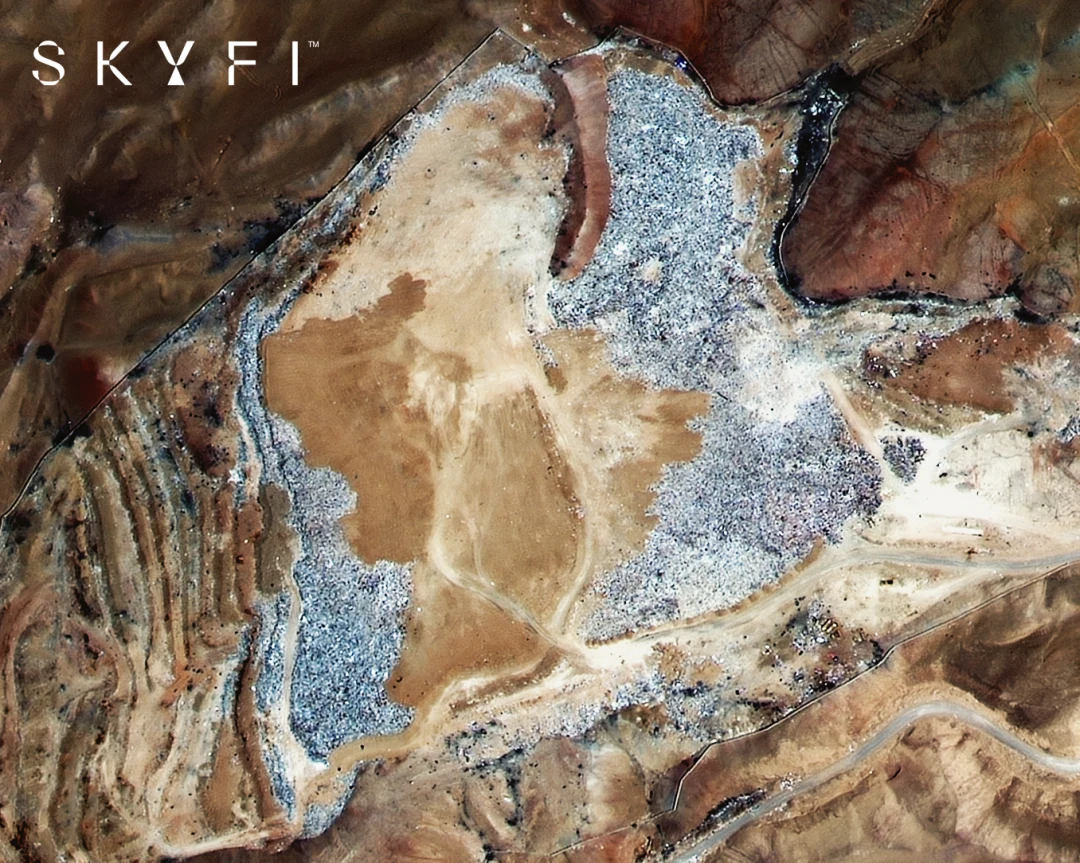
The rapidly growing pile of discarded clothing in the Atacama desert is turning into a mountain, and is visible from space. (Image credit: SkyFi)
So, how do we become an active part of the solution, rather than a participant in perpetuating the problem? It’s undoubtedly an intricate dilemma, requiring a shift not only in core production, transport and disposal practices but also in the psychology of the consumer. For some, the pressure or desire to be on trend is fuelled by our perceptions of how we should present ourselves to the world; how we go about fostering a sense of belonging and finding what we believe to be ‘our tribe.’
There’s also the influence of individual budgets that, for many, drives the choices they make about the clothes they buy. No matter what someone’s preference might be, they may lack the financial latitude to choose the sustainably sourced, bamboo t-shirt over the one that’s pumped out by a factory somewhere in the world and is on sale for $5. As is true when it comes to so many of the products we buy, environmentally sound, sustainable, ethical choices are often reserved for the privileged.
Can we collectively reform the narrative and celebrate fashion as a form of self-expression, accessible to all and driven by an uncompromising ethos of sustainability?
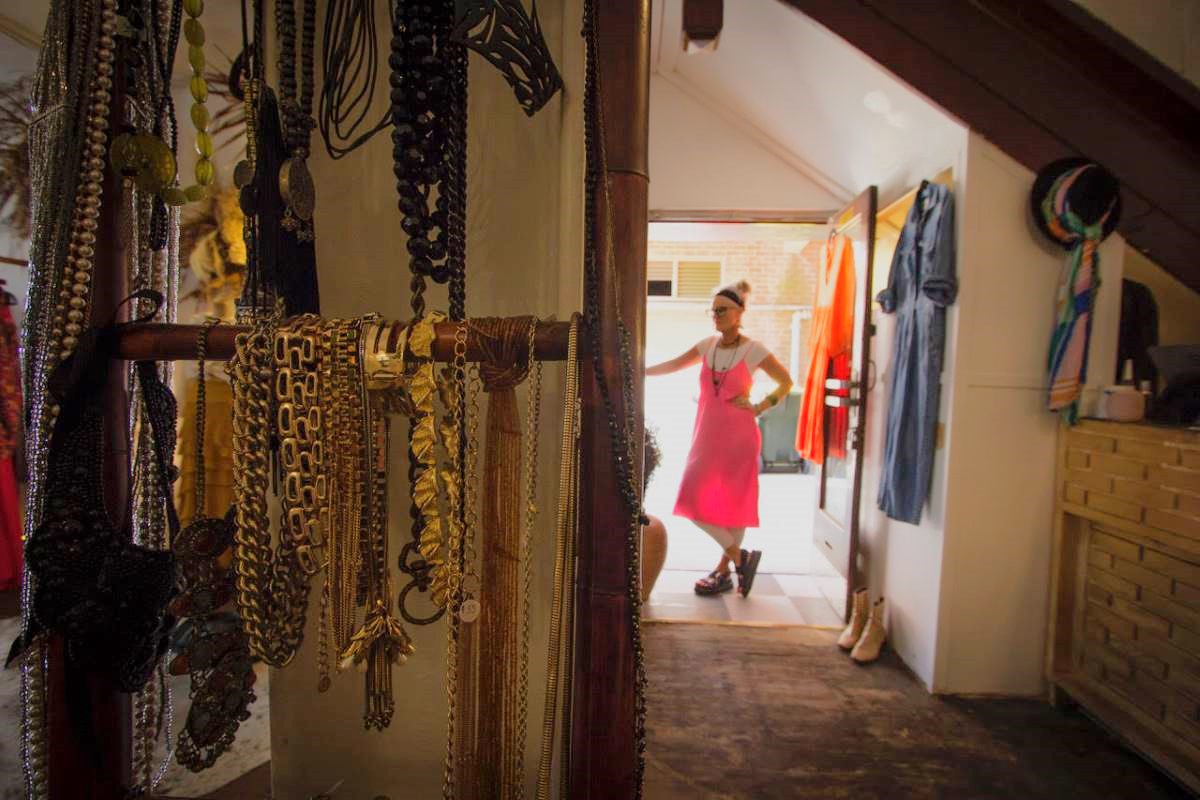
Sal catches some rays outside her store in Katoomba
Sal Isaksen is hopeful and thinks we can, but she’s adamant it will take a concerted commitment and effort from us all. Whilst Sal is quick to acknowledge the responsibility of the fashion industry, she also believes that we as individuals have a big part to play.
Ultimately, Sal would like to see more collaboration between consumers, retailers, designers and manufacturers, in terms of expectations and practical solutions to tackle the current state of play. She says, “As we move into this changing future, it’s about the collective rather than the individual.”
Sal would like to see more brands disrupting the fashion space, daring to be different, environmentally speaking. She supports the idea that fashion brands should be held to account and transparency around the impacts of their businesses on the environment should be non-negotiable.
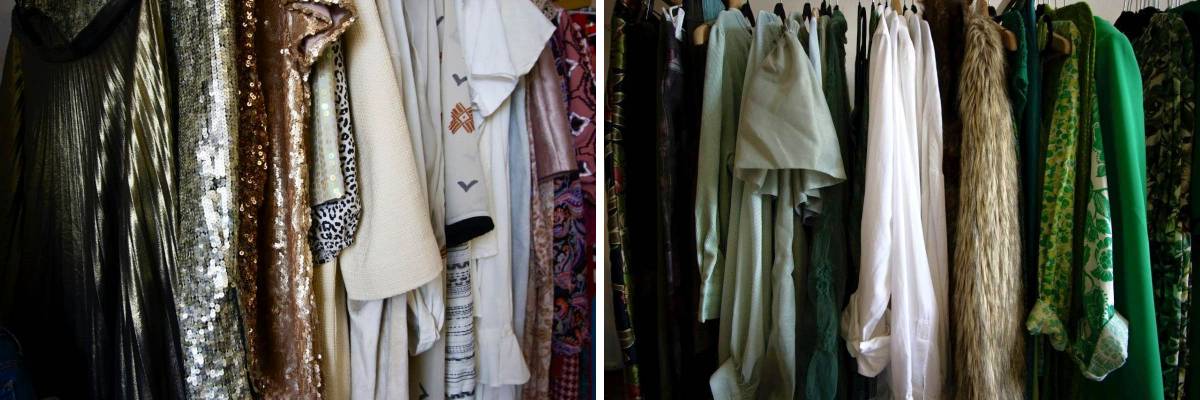
Sequins, faux fur and fab finds aplenty at SalOn Katoomba
In her own business practice, Sal sticks to a pretty simple ethos that she hopes inspires her customers to think deeply about their shopping habits. Four questions form the basis of this ethos:
- Do you need it?
- How often will you wear it?
- Where will it end up when you no longer want it?
- Do we need to follow the trends dictated to us by fashion ‘experts’ or ‘icons’ or can we, as individuals, take the lead in determining how we express ourselves through fashion?
I am so incredibly heartened by those who are already actively involved in the sustainable fashion movement: and there are many of them out there. It feels as though there’s a groundswell happening and what fills me with hope is remembering that we can all find a way to do our bit, if we choose to.
Go thrift shopping; have a clothes swap party; donate to a women’s refuge; repurpose the fabrics from your clothes that are no longer fit-for-wear; talk to your local op shops and gain an understanding about the challenges they face with surplus donations; for those of us who can, buy labels that are moving to sustainable business models and stop investing in those that are merely greenwashing. There’s an awful lot we can do to be part of a movement that’s defying those impacts of the fashion industry that are disastrous for our environment.
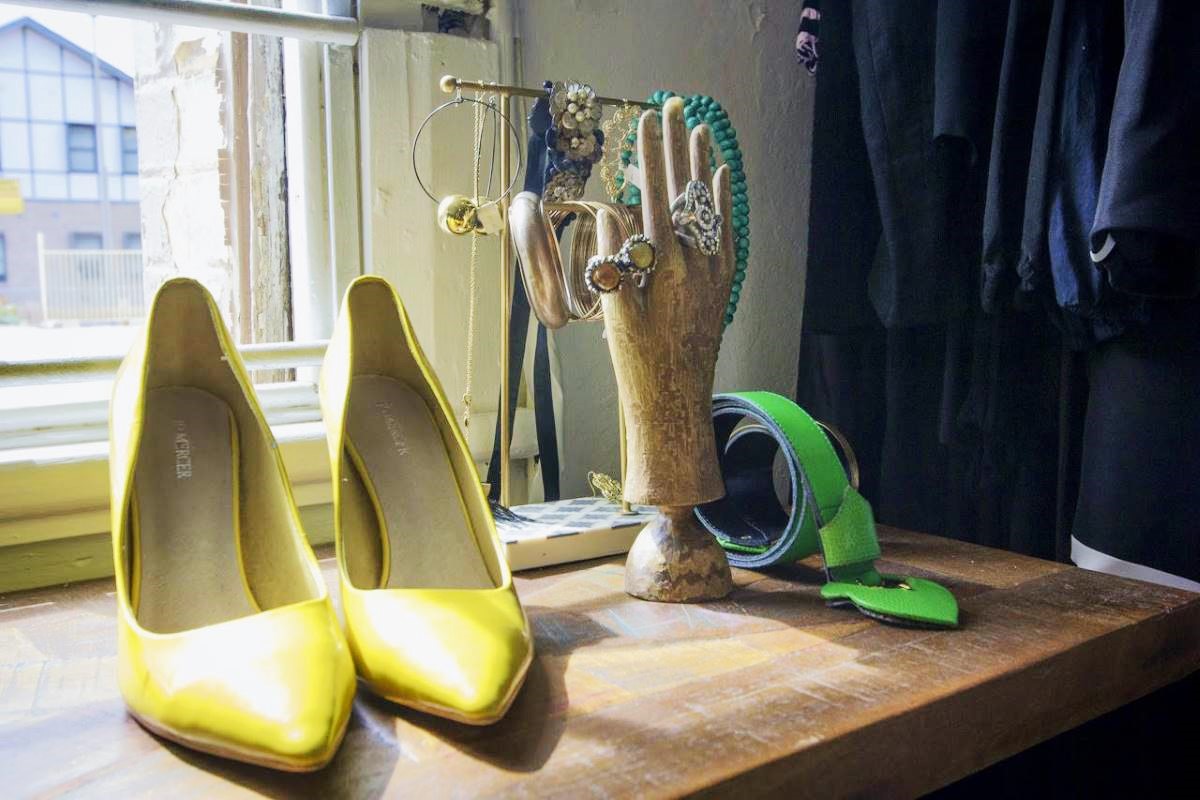
Shoes, jewellery & accessories on display at SalOn Katoomba
I know there will always be new items of clothing that we need to buy. Even the most environmentally discerning amongst us aren’t likely to start buying our knickers from an op shop, but we can take steps that will collectively put pressure on fashion labels to prioritise sustainable practices. We must move away from our belief that we have access to infinite resources when we live on a finite planet, and with limited space.
And if you’re still not convinced that you can look and feel amazing wearing thrifted pieces, then pop into Sal-on and draw inspiration from someone who is throwing her heart and soul into guiding others along a similar path to the one she’s chosen for herself. Become part of a modern-day fashion revolution because, let’s face it, sustainability is a style that looks good on us all!
You can find SalOn in the Town Centre Arcade, Shop 5, 81/83 Katoomba St, Katoomba NSW 2780
Open Weds-Sat: 10.30am – 4pm, Sunday 10.30am – 2.30pm
Take Action:
- Reduce your impact by buying less, and avoiding ‘fast fashion’ altogether
- Reuse clothing by buying pre-loved and donating or swapping your unwanted clothes. See a list of Katoomba Op Shops here
- Recycle clothes no longer fit for use via BMCC’s textile recycling trial
Share this article:
This story has been produced as part of a Bioregional Collaboration for Planetary Health and is supported by the Disaster Risk Reduction Fund (DRRF). The DRRF is jointly funded by the Australian and New South Wales governments.
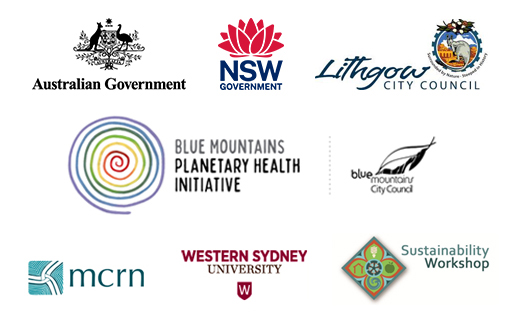
More from around the region
Over 80 people gathered in Peace Park Katoomba today to reflect on all victims of war: those who died in battle; those who were maimed physically and/or psychologically; the suffering of loved ones and relatives on the homefront; and those who opposed conscription and war. It was an opportunity to reflect on the causes of war and call for a future of peace and reconciliation. @bm_peace_collective
#peace #anzacday #peacenetwork #planetaryhealth #katoomba #bluemountains
‘The resistance’ to the destructive forces at play in our world is alive, well and spreading infectiously in the welcoming and inclusive zine community. Zines are small, handmade independent `magazines` that are not-for-profit and made for love. Read about the recent inspiring Blue Mountains Zine Fair in our Katoomba Area Local News here: https://www.katoombalocalnews.com/blue-mountains-zine-fair/ (link in profile)
and go along to the Mtns Zine Club`s monthly meet-up for making, swapping and sharing zines this Sunday 27 April at the Blue Mountains Cultural Centre from 1.30 to 3.30pm (usually on third Sunday of each month)
@mtnszineclub
#zines #independentpublishing #resistance #planetaryhealth #club #bluemountains #katoomba #artmaking #creative
Do you have food growing in your garden over winter? At our next Skill Share on Saturday 3 May you can find out which edible foods grow well over winter in a cold climate, and get hands-on experience building and planting out a no-dig garden bed with a winter crop at the Planetary Health Centre.
Through this process you will be given an introduction to permaculture and learn more about seed saving, seed germination, composting and cold climate gardening strategies.
Seeds and seedlings will be shared to help you get started at home! Places are limited so bookings essential here:
http://bit.ly/4jqRerw (link in profile)
#coldclimategardening #wintergardens #ediblegardens #bluemountains #katoomba #planetaryhealth #permaculture #skillshare
At the Blue Mountains Interfaith Gathering on the 30 March, 97-year old Sister Jacinta Shailer from the Sisters of the Good Samaritan urged us to respond to the increasing challenges facing us by `joining heroic communities’. Read more about what she said and all the other inspiring contributions on the day in our Katoomba Area Local News here:
https://www.katoombalocalnews.com/create-heroic-communities/ (link in profile)
#interfaith #heroiccommunities #bahai #brahamkumaris #quakers #unitingchurch #catholic #bluemountains #planetaryhealth #katoomba @planetaryhealthalliance
Our Planetary Health newsletter is now out! Read about the Trainee Administration Position available with the Planetary Health Centre, our upcoming workshops, and the Heroic Communities of the Blue Mountains who are finding housing for older women; creating inclusive and creative alternative media with zines; sharing their faith in the value of compassion, love, kindness, gratitude and joy; and sharing skills for improving physical and mental health and restoring habitat for wildlife, reducing textile waste and growing seeds and edible gardens.
Follow the link here:
https://bit.ly/42l8W9O (link in profile)
#jobs #planetaryhealth #housing #housingforolderwomen #skillshare #bushcare #ediblegardens #heroiccommunities #zines #seedsaving #interfaith
It was gloriously sunny and we had a fabulous day of sharing at the Planetary Health Centre yesterday, from T`ai-chi to workshops on the Frogs of the Blue Mountains, Fashion Upcycling and How to Build a Survival Garden in the Blue Mountains. We finished with a Bushcare session in which we enjoyed the beautiful bushland on the site and removed invasive weeds to expand the habitat for wildlife around our swamp. We were joined by frogs in our pond and the little echidna who returned for a swim! Thank you to everyone who shared so generously. We tasted Yacon and shared rhizomes, Purple Congo Potatoes, Oca, Turmeric, and seeds for Salsify, Egyptian Spinach, Red Mustard, Echinacea, Parsley, Chard, Radish, and Red Noodle Beans. Our next Skillshare Saturday will be on the first Saturday of May. If you`d like to be notified of all our workshops, and the meetings of our Seed Saving and Gardening Groups, subscribe to receive the fortnightly Planetary Health newsletter at any of our Local News sites like www.katoombalocalnews.com (links in profile) #skillshare #planetaryhealth #taichi #qigong #frogs #bluemountains #katoomba #fashionupcycling #upcyclingfashion #survivalgardens #seedsaving #loofah #community
Our Skillshare Saturdays are on the 1st Saturday of every month and we`re looking forward to a beautiful sunny day tomorrow for our first Morning T`ai-chi & Qigong. Fashion Upcycling is booked out this month, but we still have a few places for Frogs of the Blue Mountains, Building a Survival Garden and Planetary Health Bushcare. Bookings via Eventbrite (links in profile). For more information ph. 0407 437 553
#skillshare #planetaryhealth #sunnyday #katoomba #bluemountains #taichi #qigong #frogs #seedsaving #survivalgardens #bushcare
Imagine, if just once a month, everyone gave a few hours back to nature to repair the damage we`ve done. We would so quickly restore the habitat of so many species struggling to survive and provide the habitat for many more to flourish. Once a month, for three hours, our Planetary Health Bushcare group does just that. We`re repairing the damage of human impact and being immediately rewarded by our time in nature and the great company of the other members of our Bushcare Group. We`ll be meeting again this Saturday 5 April at 1.30pm and all are welcome to join us and learn more. Contact Karen Hising at [email protected] or call the Bushcare Office on 4780 5623 if you`d like to give it a try.
For more information about the Planetary Health Centre and how you can get involved contact the Planetary Health office on 0407 437 553
#bushcare #biodiversity #wildlife #habitat #regeneration #planetaryhealth #community #allinthistogether #bushcare #katoomba #bluemountains


